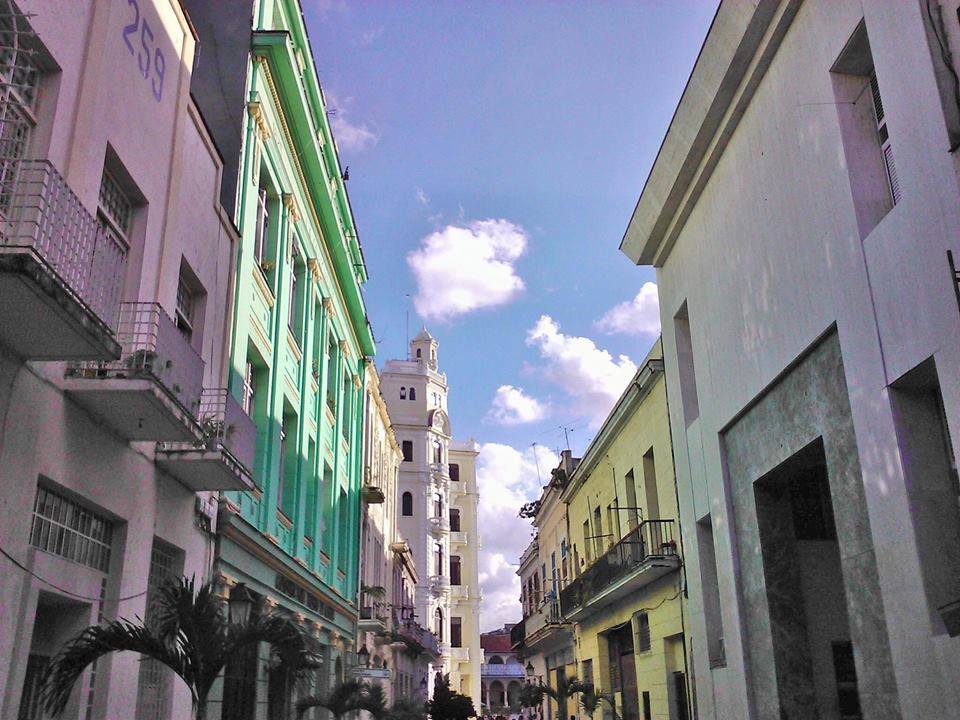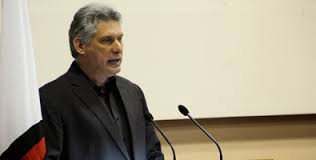DE COMO MIGUEL DÍAZ CANEL recuerda que …. “la disyuntiva es socialismo o barbarie”.
La descomposición del régimen preocupa al autoritario gobierno de Cuba.
En el pasado congreso de la Unión de Escritores y Artistas de Cuba (UNEAC), el primer Vicepresidente y sucesor designado, Miguel Díaz Canel, pidió a los intelectuales y artistas de la isla que no olvidaran que la “disyuntiva es socialismo o barbarie”. La célebre frase de Rosa Luxemburgo en “The Junius Pamphlet” (1916), calificaba, a partir de una idea de Friedrich Engels, la Primera Guerra Mundial como una “regresión al barbarismo”, que amenazaba con aniquilar la civilización. Según Luxemburgo, la única forma de conjurar la debacle era por medio de un socialismo que, a diferencia del bolchevique, no centralizara burocráticamente la vida política con el “espíritu vigilante” y la “virtud del terror”, propios de un partido único, que heredaba elementos despóticos del zarismo.
El pasaje de Luxemburgo, como es sabido, inspiró la asociación y la revista Socialisme ou Barbarie, encabezadas por los trotskistas y consejistas franceses Cornelius Castoriadis y Claude Lefort entre 1948 y 1965. Castoriadis y Lefort se opusieron al estalinismo y a la expansión del bloque soviético hacia Europa del Este, desde un socialismo democrático, que adelantó algunas ideas del mayo francés del 68. Si la barbarie a la que se refería Rosa Luxemburgo no excluía los elementos autoritarios del leninismo, ya la barbarie que combatirán Castoriadis y Lefort será tanto el totalitarismo nazi o fascista como el estalinista, el imperialismo capitalista como el soviético.
HACIA DÓNDE VA CUBA…
.. Si no hay una apertura, Díaz Canel no podrá representar la creciente diversidad social del país.
Ahora, el sucesor designado de Raúl Castro, vuelve a la misma disyuntiva, pero con sentidos notablemente distintos. El socialismo que defiende Díaz Canel es el establecido en los artículos 3º, 5º y 62º de la Constitución cubana vigente, es decir, un régimen “irrevocable” de partido comunista único, ideología “marxista-leninista y martiana” y control de la sociedad civil y los medios de comunicación por parte del Estado. Un socialismo, por tanto, diferente al de Rosa Luxemburgo, Cornelius Castoriadis, Claude Lefort… y hasta Hugo Chávez. La única diferencia entre ese socialismo y el comunismo soviético es que el cubano, en las primeras décadas del siglo XXI, se abre más plenamente al capitalismo de Estado que los trotskistas cuestionaban desde mediados del siglo XX.
Pero así como es fácil entender a qué socialismo se refiere Díaz Canel, se vuelve complicado dilucidar el segundo término de la alternativa. Hay que llenarse de paciencia y leer todo el discurso ante el congreso de la UNEAC para advertir que esta vez la “barbarie” a la que se refiere Díaz Canel no es el “imperialismo yanqui” sino un mal endógeno. Un proceso de descomposición ideológica del régimen, que los burócratas llaman, conservadoramente, “pérdida de valores”. El avance del mercado, las nuevas tecnologías y el pluralismo civil está produciendo, junto a una sociedad cada vez más desigual, una cultura popular, sobre todo entre los jóvenes, que rebasa la ideología oficial.
Esa es la “barbarie”, según la burocracia cubana: un mundo de reggaeton, celulares, iPods y videojuegos, de moda, consumo, globalización y juventudes deseosas de viajar o emigrar. Una barbarie que, en efecto, está destruyendo desde adentro la civilización comunista construida en Cuba, entre los años 60 y 80. Las élites cubanas entienden la historia reciente de la isla como una lamentable decadencia progresiva del orden comunista, que arranca en los 90 y se agudiza en la pasada década, bajo los efectos de la mundialización, el acceso al mercado, el incremento del turismo y la mayor conectividad entre las comunidades de la isla y la diáspora.
Esas élites son conscientes de que la “barbarie” es incontenible, pero piensan que pueden domesticarla por medio una concepción jerárquica de la sociedad y el Estado. El mercado, piensan a la manera feudal, está bien para pequeños segmentos privilegiados –empresarios, músicos, artistas, burócratas…-, pero no para las mayorías populares , que no pueden traspasar del apartheid de la economía estatal y los organismos del gobierno. Con cierta dosis de capitalismo y nada de democracia –sin libertad de asociación y expresión, ni oposición reconocida por las leyes, ni internet-, sueñan salvar su vieja civilización de los bárbaros del siglo XXI.
Habrá que ver si lo logran, cuando llegue la hora de la desaparición biológica de los líderes históricos y de la sucesión de poderes. Apenas en dos años se iniciará un proceso electoral en Cuba que, supuestamente, debería culminar en el traspaso de mandos de Raúl Castro a Miguel Díaz Canel. Si de aquí a entonces no se emprende una reforma constitucional, que abra el sistema político a nuevos liderazgos autónomos, el gobierno sucesor nacerá marcado por un signo autoritario que le impedirá representar la creciente diversidad social del país. Esa podría ser la hora de los bárbaros.
El País,Spain/Rafael Rojas/ Excerpts/InternetPhotos/www.thecubanhistory.com
MIGUEL DÍAZ CANEL, recuerda que …. la disyuntiva es “socialismo o barbarie”.
The Cuban History, Hollywood.
Arnoldo Varona, Editor
(Calles de La Habana) (Cuba en Fotos).

AS OFFICIAL Miguel Díaz Canel reminded.. “the choice is socialism or barbarism”.
The decomposition scheme concern to the authoritarian government of Cuba .
In the last congress of the Union of Writers and Artists of Cuba (UNEAC ), the first vice president and designated successor, Miguel Diaz Canel , called on the intellectuals and artists of the island not to forget that ” choice is socialism or barbarism.” The Rosa Luxemburg famously in “The Junius Pamphlet ” (1916 ) , described , from an idea of Friedrich Engels , the First World War as a “regression to barbarism ” that threatened to annihilate civilization. According to Luxembourg, the only way to avert the debacle was through socialism , unlike the Bolsheviks , not bureaucratically centralize political life with “watchful spirit ” and ” under terror” , typical of a single party , which despotic elements inherited from Tsarism .
The passage of Luxembourg, as is known , inspired the association and the journal Socialisme ou Barbarie , led by Trotskyists and French councilists Cornelius Castoriadis and Claude Lefort between 1948 and 1965. Castoriadis and Lefort Stalinism and the expansion of the Soviet bloc opposed to Eastern Europe, from a democratic socialism , he advanced some ideas of the French May 68. If the barbarism that Rosa Luxemburg was referring not exclude the authoritarian elements of Leninism , and barbarism that will combat both Castoriadis and Lefort be Nazi totalitarianism Stalinist or fascist as the Soviet capitalist imperialism .
WHERE IS CUBA GOING…
.. If there is no opening , Diaz Canel won’t be able to represent the increasing social diversity of the country.
Now, the designated successor Raul Castro, returns to the same dilemma , but with significantly different meanings . Socialism defending Diaz Canel is the provisions of Articles 3, 5 º and 62 º of the Cuban Constitution in force , ie an “irrevocable ” the single communist party ideology ” Marxist- Leninist and Martí ” and control of civil society and the media by the state . Socialism , therefore, different from Rosa Luxembourg, Cornelius Castoriadis , Claude Lefort … and even Hugo Chavez. The only difference between that socialism and Soviet communism is that Cuba , in the early decades of the century, opens more fully to state capitalism the Trotskyists questioned since the mid- twentieth century.
But as it is easy to understand what socialism refers Diaz Canel , it becomes difficult to elucidate the second term of the alternative. It should be filled with patience and read the entire speech before Congress to warn UNEAC this time “barbarism ” which refers Diaz Canel is not “Yankee imperialism ” but a bad endogenous . A process of ideological breakdown regime bureaucrats conservatively call ” loss of values ” . The market development , new technologies and civil pluralism is producing , along with an increasingly unequal society , popular culture , especially among young people, which exceeds the official ideology.
That’s the ” barbarism ” as the Cuban bureaucracy : a world of reggaeton , cell phones, iPods and video games , fashion , consumption, globalization and youth eager to travel or emigrate. A barbaric indeed being destroyed from within civilization built in communist Cuba , between 60 and 80. Cuban elites understand the recent history of the island as a regrettable progressive decline of the communist order , which starts at 90 and is worse in the past decade, under the influence of globalization , market access , increased tourism and greater connectivity between communities of the island and the diaspora.
These elites are aware that “barbarism ” is overwhelming , but think they can tame it through a hierarchical view of society and the state. The market, the feudal think so , fine small – privileged segments entrepreneurs , musicians , artists , bureaucrats … – but not for the popular majority , which can not pass the apartheid economy and state government agencies . With a dose of capitalism and democracy no – no freedom of association and expression , or opposition recognized by law , no internet – dream to save his old civilization of the barbarians of the XXI century.
Will have to see if they do, when the time of biological demise of the historical leaders and succession of power comes. Just over two years an election process in Cuba should supposedly culminating in the transfer of control of Raúl Castro Miguel Diaz Canel starts. If now and then a constitutional reform , opening the political system to new autonomous leadership , the successor government born marked by a sign that will prevent authoritarian represent the increasing social diversity of the country is taken. That could be the time of the barbarians.
El País , Spain / Rafael Rojas /Excerpts/ InternetPhotos / www.thecubanhistory.com
MIGUEL DIAZ CANEL , remember …. the choice is ” socialism or barbarism.”
The Cuban History , Hollywood.
Arnoldo Varona , Editor






